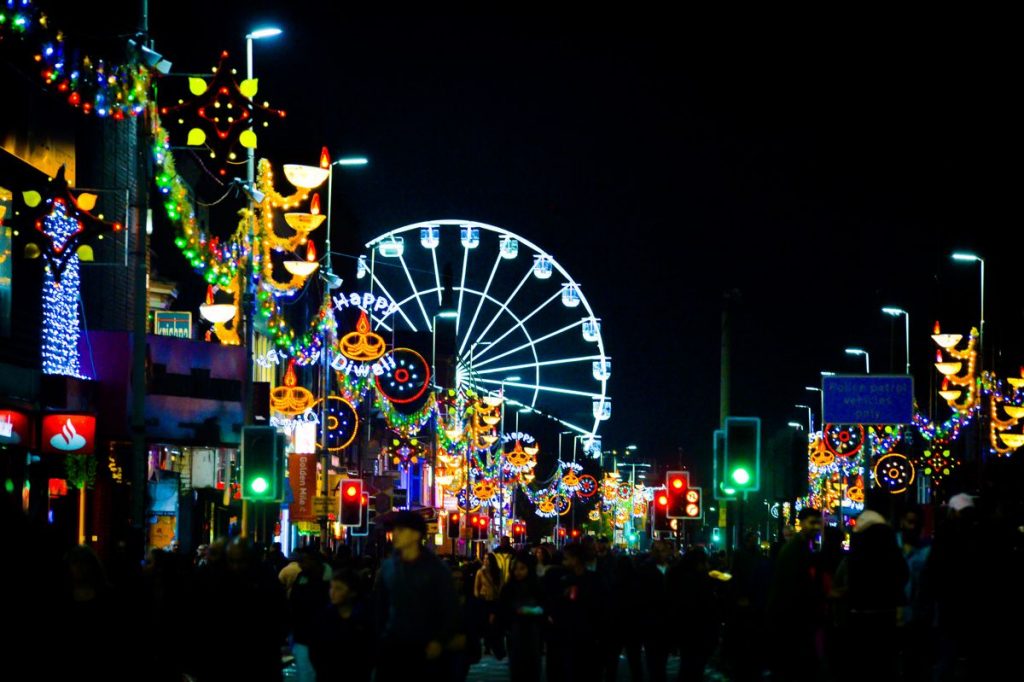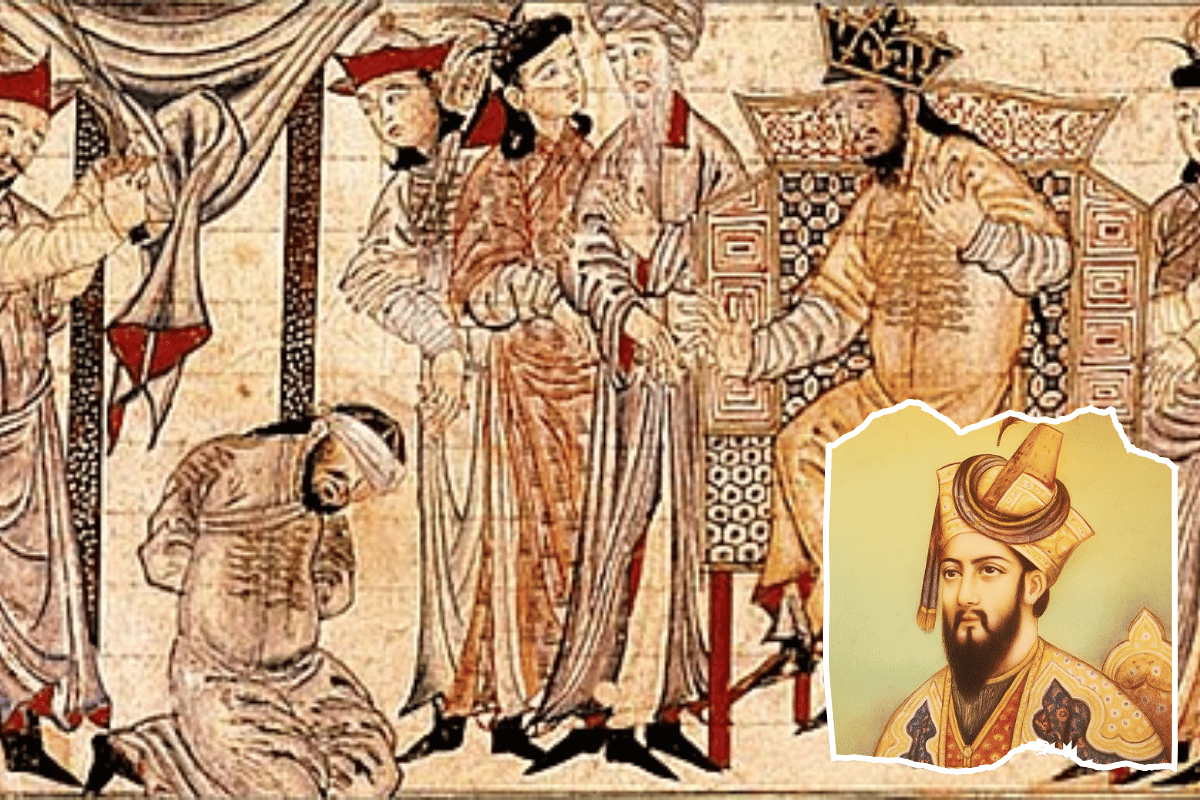
Diwali has long been a symbol of pride and belonging for Britain’s Hindu community. Once small home gatherings, it has grown into major public celebrations in cities like Leicester, London and Birmingham. Yet today, these festivals face new pressures from political decisions to security restrictions, threatening to dim the light of a tradition built on resilience and joy.

Leicester Diwali 2025
Leicester’s Diwali celebrations are among the most significant in the country. The festival began in the 1950s and 1960s with small home-based observances, as early community members worked to keep their faith and traditions alive. Its scale grew in the 1970s with the arrival of Hindus expelled from Uganda, bringing new energy and demand for traditional celebrations. The introduction of decorative lights in the 1980s and the establishment of the Belgrave Neighbourhood Centre helped transform Diwali into a major public event. By the 1990s, the celebrations along Belgrave Road drew thousands of visitors each year and gained national recognition, featuring fireworks, entertainment, and extensive city-wide event management to ensure safety and smooth operations.
Changes to Diwali 2025
Leicester’s city council has announced major changes to this year’s Diwali celebrations on Belgrave Road, citing public safety concerns over record crowds of up to 50,000 in recent years. The Golden Mile will stay as the venue, but without stage entertainment, fireworks, or Cossington Street activities to reduce congestion. City Mayor Peter Soulsby (Labour) and Assistant City Mayor for Culture Cllr Vi Dempster (Labour) said the festival had become a “victim of its own success,” explaining that emergency services and crowd control experts have warned the event can no longer continue safely in its previous format. On 3rd September 2025, Leicester’s Safety Advisory Group rejected all proposals for extra Diwali activities on Belgrave Road, leaving this year’s 20th October celebrations limited to lights and the Wheel of Light (the Illuminated Ferris wheel that is put up during Diwali and Christmas) due to crowd safety concerns.
Community groups fear the event will feel “hollowed out” without the traditional festivities. The Belgrave Business Association, which offered to fund and steward extra activities, expressed disappointment, and local leaders, including Leicester East MP Shivani Raja, are urging a review to protect the city’s much-loved celebration.
Peter Soulsby’s historic anti-Hindu bias
In Leicester in 2022, tensions erupted after an India–Pakistan cricket match when India cricket fans of all faiths celebrated their team’s win, waving flags and dancing. A minor clash over a flag escalated due to misinformation and anti-Hindu social media campaigns, portraying Hindus as aggressors. Over the following weeks, Hindus, their homes, and temples were targeted by Muslim mobs. Dozens of attacks took place, including egg-throwing, physical violence, stabbings, and threats. Hundreds of Muslims gathered outside the Shivalaya Temple on Belgrave Road, amongst a heavy police presence. In front of the police, a Muslim youth climbed on the wall where sacred Hindu saffron flags were flying and proceeded to remove and then burn the flag. Many Hindus felt unsafe, fearing for themselves and their families, while police struggled to contain the disorder. The unrest highlighted the vulnerability of Leicester’s Hindu community and the role of false narratives in inflaming violence.
Hindu and Jain community leaders in Leicester accused Mayor Peter Soulsby of disregarding their concerns by launching the review of the 2022 unrest during the Hindu New Year and supporting the appointment of Dr Chris Allen, despite their objections that his past comments and focus on Islamophobia showed a lack of balance. Dr Chris Allen was captured on video asserting that 9/11 was a conspiracy theory. They argued that Soulsby failed to acknowledge their concerns around Hinduphobia and pushed ahead without ensuring a process that felt fair or transparent to the Hindu community.
Peter Soulsby met with Majid Freeman, who was the chief perpetrator of spreading false information against Hindus at this time, which led to attacks on Hindus. Their frustration deepened after Soulsby, based on Freeman’s anti-Hindu propaganda, suggested without evidence that the violence had roots in “ideologies” from the Indian subcontinent, including ‘Hindutva’, a remark that many Hindus saw as prejudging the inquiry and casting their community in a negative light. Soulsby directly used Hindutva in its distorted form, not recognising that the word literally translates to ‘Hinduness’. The city Mayor’s decision to meet and take guidance from an individual who was later convicted and imprisoned for his involvement in the attacks against Hindus has deepened concerns within the Hindu community. It highlights both a perceived lack of judgment and contributes to the broader mistrust toward his leadership, with many viewing the cancellation of Diwali celebrations as further evidence of underlying Hinduphobia.
Soulsby’s unpopularity has been growing in Leicester. Leicester City Council recently voted against abolishing the directly-elected city mayor role, currently held by Soulsby. Conservative and Green councillors had argued that the system, in place since 2011, concentrates power in one individual and fails to address ongoing issues in housing and social care. Soulsby’s tenure as Mayor of Leicester has been marked by repeated controversies, including criticism over his salary amid service cuts, a high-profile bribery allegation (though the accused was acquitted), a widely publicized bus lane fine incident on Christmas Day, a breach of COVID-19 lockdown rules, and ongoing concerns that the mayoral system concentrates power while failing to address service shortfalls transparently.
Birmingham Diwali Mela and Martyn’s Law
In Birmingham, the Diwali Mela has been postponed for the second year in a row, with organisers citing safety concerns, funding issues, and new security requirements under Martyn’s Law. Once a vibrant celebration that filled Soho Road with lights, music, and food, the event now stands dimmed by caution and regulation. What was once a proud symbol of unity and joy has become another casualty of tightening restrictions, leaving many to wonder whether safety is being protected or whether community spirit is being quietly stifled.
Martyn’s Law, introduced as the Terrorism (Protection of Premises) Act 2025, was created to strengthen public safety by requiring large events and venues to adopt anti-terrorism measures such as risk assessments, CCTV, and crowd management plans. While its intentions are rooted in the tragic lessons of the Manchester Arena attack, its implementation has begun to cast a shadow over community events that pose no such threat. In practice, the law is being used to restrict rather than protect, placing heavy regulatory and financial burdens on peaceful cultural gatherings like Diwali celebrations. For many Hindu organisers, these requirements feel less like safeguards and more like barriers, forcing cancellations and postponements under the guise of security. What was meant to defend communities from harm is, in effect, dimming their ability to celebrate freely and visibly.
British Hindus are concerned
The growing restrictions on Diwali celebrations are deeply concerning for British Hindus because they signal a gradual erosion of cultural visibility and confidence in public life. What were once open, joyful expressions of faith and community are increasingly being constrained by bureaucracy, politics, and misplaced caution. For many, these changes reinforce a sense of exclusion, that Hindu traditions are tolerated, but not truly valued. As festivals shrink and public space for celebration narrows, British Hindus are left questioning whether their contributions to the nation’s multicultural identity are being quietly sidelined. Curtailing events like this plays directly into the hands of the extremists and terrorists. While it’s crucial to remain fully aware of the serious threat posed by Islamist extremism in this country, especially at public gatherings, more must be done to ensure such cultural and religious events are protected and allowed to flourish. When these festivals are restricted, it is peaceful faith communities that bear the cost.









